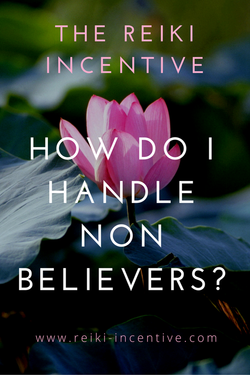
I simply LOVE this question. Read on and I'll explain.. I recently asked a large group of Reiki practitioners and students what their biggest question, challenge or concern was when thinking about taking their Reiki practice forward. By far one of the biggest areas of concern related to a real fear as a practitioner of not being taken seriously, of not knowing how to respond to other people's perceptions and how to approach people who do not consider Reiki as a valid form of therapy. Typical fears that practitioners had were:
I have SO been there and felt that. Have you? I first heard about Reiki in 1993 in Australia. A close cousin of mine recommended that I should try a treatment if ever I had the chance. I didn't really understand what Reiki was, but that chance finally arrived very much later in 2002 when a friend and newly qualified Reiki practitioner suggested I try a treatment with her. She was sure that it would be helpful for my chronic back and hip pain. To be honest, I was somewhat sceptical and rather unsure about the whole process. But she meant well and I was happy to go along and try this free treatment. I really enjoyed the treatment and was absolutely fascinated by the whole experience. It certainly give me some short term relief, but much more than that – it opened a window for me. Training soon followed, and I set up in practice. And boy, did those fears kick in! My fears weren't helped by the fact that at the same time I was working in our National Health Service. Whilst on the one hand I was extremely privileged to watch as a team of highly specialist professionals incorporated the latest treatments to help people suffering with chronic pain. These new approaches included Acceptance and Commitment Therapy and other Mindfulness based treatments which, like Reiki have their roots in Japanese Buddhism. I was on a fascinating journey of discovery as I continued with my Reiki training, learning more and more about the traditional Japanese practices, treating myself and others with Reiki and learning through experience how supportive and valuable Reiki can be. I began to see overlap between Reiki practice and many of the techniques used by the team. But oh boy! Try to engage in a discussion about this with medics in the UK and you might be in for a fight! You might find one or two who will show a quiet interest, but the rest – they'll either fall of their chair laughing or more commonly get angry or defensive - “It is all nonsense, there is no scientific evidence, it's not scientifically plausible, it's quackery, it's nothing short of a pyramid marketing scam etc. etc” blah de blah de blah… One objection I frequently encountered was that Reiki needed to be evaluated by properly conducted clinical trials which needed to be published in peer reviewed journals. Say what? In some ways it felt like a deliberate put down designed to shut me up and cut me off at the knees. It wasn't, and I'm still great friends with my colleagues from that time. It inspired me to rise to the challenge and to get on top of this whole issue so that I could understand it properly and engage with the arguments on an equal footing. I completed a masters degree in health research and really got inside the whole issue. It's a great and important one. So, back to our original question about our fears of not being taken seriously as Reiki practitioners. Many of us practitioners secretly hold these fears and we'll certainly come across prospective clients who won't view our practice as valid. But... I have been lucky enough to personally discover that ideas from Japanese Buddhism are being used now in mainstream medical practice (even here in the UK!), ideas which share a common heritage with Reiki and which also run through the Reiki principles and teachings. I've also personally unpicked the issue of clinical evidence, looking at what research has been done and how, what it shows and how it can (and should) affect and enhance our practice. More and more academics are looking into Reiki. They are beginning to reveal just where and how Reiki is shown to be helpful, although the research so far consists of small studies, and some have not been well designed - yet. But this is still a very exciting time for Reiki. I feel personally inspired to share this information with those from the Reiki world who, like me, hold the above fears and are interested in overcoming them in a professional way with a view to taking Reiki forward in the world, perhaps to people who would otherwise never have considered or experienced it. Look through the blog, where I share some of the findings of various studies. Most health professionals have access to research guidance as part of their roles. It's time we had the same so that we can move forward professionally, really pitch Reiki effectively and get it out there to those who might otherwise not get the opportunity to benefit from it. Sign up below and I'll keep you informed about new posts and resources. Also, why not look at my Top 5 Strategies for Explaining Reiki. You can download a copy there too, It's free!
4 Comments
|
Author
Angela established the Reiki Incentive for Reiki practitioners who want to see Reiki more widely accepted and to see it reach new people. She enjoys sharing her passion for authentic practice as well as research into the benefits of this wonderful therapy. Archives
May 2018
Categories
All
|

 RSS Feed
RSS Feed
